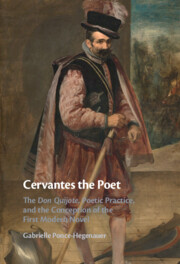 Cervantes the Poet
Cervantes the Poet Published online by Cambridge University Press: 11 May 2023
Chapter 6 examines the force of lyric subjectivity as narrative emplotment in the Galatea. At the confluence of verse and prose, allegory and history, mimesis and poiesis, this chapter treats the Galatea and contemporary works, beginning with the 1582 transition from verse to prose in Pedro de Padilla’s Églogas pastoriles (Seville). While the Galatea has often been dismissed in scholarship as a partially formed and immature work, or reinterpreted through standard approaches to the DQ, this chapter studies the chronotopic dynamism of Cervantes’ first prose fiction through the narrative emplotment of Lauso’s lyric interior. It is attuned to the sophisticated narrative architecture of an unprecedented capacity to juggle multiple lyric temporalities within a single narrative landscape. The Galatea lent novelistic immediacy to the timeless retreat of the pastoral through the use of lyric subjectivity. As a meditation on the nature of love and lyric subjectivity inherent in Pastoral Petrarchism, in the Galatea the figura of the poet as literary character was fully developed in Lauso. As a novel in key, the Galatea not only pertained to the fábulas of Cervantes’ literary milieu, it also wove a tapestry of narrativized lyric intersubjectivity necessary to the conception of the first modern novel.
To save this book to your Kindle, first ensure no-reply@cambridge.org is added to your Approved Personal Document E-mail List under your Personal Document Settings on the Manage Your Content and Devices page of your Amazon account. Then enter the ‘name’ part of your Kindle email address below. Find out more about saving to your Kindle.
Note you can select to save to either the @free.kindle.com or @kindle.com variations. ‘@free.kindle.com’ emails are free but can only be saved to your device when it is connected to wi-fi. ‘@kindle.com’ emails can be delivered even when you are not connected to wi-fi, but note that service fees apply.
Find out more about the Kindle Personal Document Service.
To save content items to your account, please confirm that you agree to abide by our usage policies. If this is the first time you use this feature, you will be asked to authorise Cambridge Core to connect with your account. Find out more about saving content to Dropbox.
To save content items to your account, please confirm that you agree to abide by our usage policies. If this is the first time you use this feature, you will be asked to authorise Cambridge Core to connect with your account. Find out more about saving content to Google Drive.